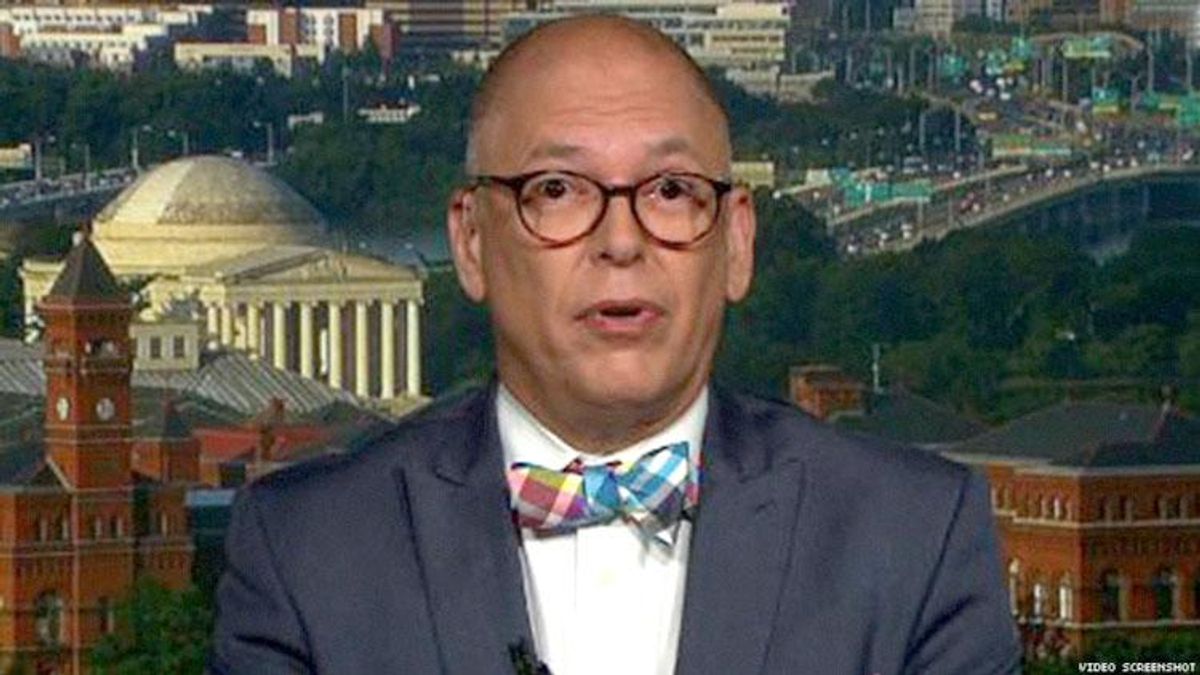If Amy Coney Barrett is confirmed to the Supreme Court, she may consign LGBTQ+ families to something she warned against in her remarks to the U.S. Senate: "a shallow and unfulfilling life," according to the man whose name is on the court's 2015 marriage equality decision.
That man, Jim Obergefell, appeared on a Zoom conference Tuesday, organized by Family Equality, to speak out against Barrett's confirmation, along with Rick Hodges, the man named as defendant in that decision; Denise Brogan-Kator, interim CEO and chief policy officer at Family Equality; and three Democratic U.S. senators, Sherrod Brown of Ohio, Patty Murray of Washington, and Ron Wyden of Oregon.
Obergefell, who is now director of individual giving at Family Equality, noted that in her opening statement at her confirmation hearings last week, Barrett said, "There is a tendency in our profession to treat the practice of law as all-consuming, while losing sight of everything else, but that makes for a shallow and unfulfilling life."
"This is exactly what LGBTQ+ youth and families, indeed the entire LGBTQ+ community, could be facing -- a shallow and unfulfilling life -- with upcoming oral arguments before the court about our families, a recent dissent by Justices Thomas and Alito again opposing the court's ruling in my case, and the potential confirmation of Judge Barrett to the highest court in the land."
Barrett was often evasive when questioned by senators during the hearings, but in other venues she has stated her opposition to the Obergefell v. Hodges marriage equality decision, to a ruling that upheld the Affordable Care Act, and to Roe v. Wade, the ruling that recognized the right to abortion. All these issues, not just marriage equality, affect LGBTQ+ people -- many of them receive health insurance under the ACA, on which the court will hear a case in November, and depend on its antidiscrimination provisions, while the abortion rights decision is predicated on the right to privacy.
She has said marriage equality should have been decided state by state through the legislative process, but Obergefell said this would result in what was termed "skim milk" marriage by the late Justice Ruth Bader Ginsburg, who Barrett would succeed.
Before the 2015 ruling in his case, he said, same-sex couples could have only "skim milk" marriages, "marriages in which, depending on state laws, we were not recognized as the families that we are; we could not file taxes jointly, or make medical decisions for one another, or, after a death, be treated legally as the surviving spouse."
Another concern of LGBTQ+ rights advocates and others is that Barrett's far-right ideology will affect the ability to form families. Another case the court will hear in November, Fulton v. City of Philadelphia, will decide whether private organizations that hold government contracts to provide social services -- in this case, foster care -- have to comply with that government's laws against discrimination. The case arose when Philadelphia ended its contract with a Catholic agency that turned away LGBTQ+ people seeking to be foster parents.
Also, she has publicly supported a group that believes life begins at fertilization and therefore opposes forms of assisted reproduction such as in vitro fertilization because some fertilized eggs are discarded in the process.
According to a Family Equality survey, 63 percent of LGBTQ+ people forming families intend to do so through assisted reproduction, foster care, or adoption, so these issues are of key importance, Obergefell noted.
Rick Hodges was technically on the other side of the Obergefell case, because he headed the Ohio Department of Public Health, which would not issue a death certificate listing Obergefell as the surviving spouse of his husband, John Arthur, who died in 2013. The men had married in Maryland, but Ohio did not recognize their marriage.
Hodges never appeared in court in the case, however, and he actually disagreed with the state's policy. He prepared his department for the day when all Ohioans' marriages would be recognized, he said in the Zoom conference. He is a lifelong Republican and former member of the Ohio House of Representatives but is a marriage equality supporter.
"I stand here today with my friend Jim, bound by our names on a historic, momentous, and frankly, wonderful decision, to oppose the nomination of Amy Coney Barrett," he said.
The Senate Judiciary Committee is scheduled to vote Thursday on whether to advance Barrett's nomination to the full Senate, which would then vote Monday. Republicans have a majority in the Senate, and most of them haven't taken Hodges's position, so Barrett will likely be confirmed. But participants in the conference said they hope to at least delay a vote.
"President Trump and [Senate Majority] Leader Mitch McConnell are willing to move heaven and earth to rush to put another corporate special interest justice on the Supreme Court -- someone who threatens the progress we have made to advance equality for LGBTQ families and could take away their health care protections in the middle of a pandemic," Brown said. "In a matter of weeks, the Supreme Court will hear the case pushed by President Trump to overturn the entire Affordable Care Act, a move the American people have rejected over and over. That's why we should not be holding these hearings or having a vote on this nominee until Americans can make their voices heard in the election."
If Barrett is confirmed, the court would have six reliably conservative justices and three liberals. Some on the left have suggested that Congress increase the number of justices as a move to bring about more balance. Asked about this in the conference, Brown said simply that nothing is off the table.
But the speakers were also holding out hope for a delay. "I stand with Jim and Rick, and these terrific senators -- Sens. Brown, Wyden, and Murray -- to urge the Senate: Slow down," Brogan-Kator said. "Let the people decide. Tens of millions of Americans have voted. We can't parse out what this nominee will mean to everyday LGBTQ+ Americans in just a few weeks. We urge the Senate to wait to confirm the next justice until after the next president is inaugurated on January 21."


















































































